Key takeaways:
- Flexibility and adaptability are essential in navigating unexpected contextual challenges, allowing for growth and innovation.
- Mindfulness and self-reflection, such as journaling, enhance self-awareness and help in managing emotional responses to work-related stress.
- Sharing experiences and collaborating with others can provide new insights and foster a supportive environment, transforming challenges into growth opportunities.
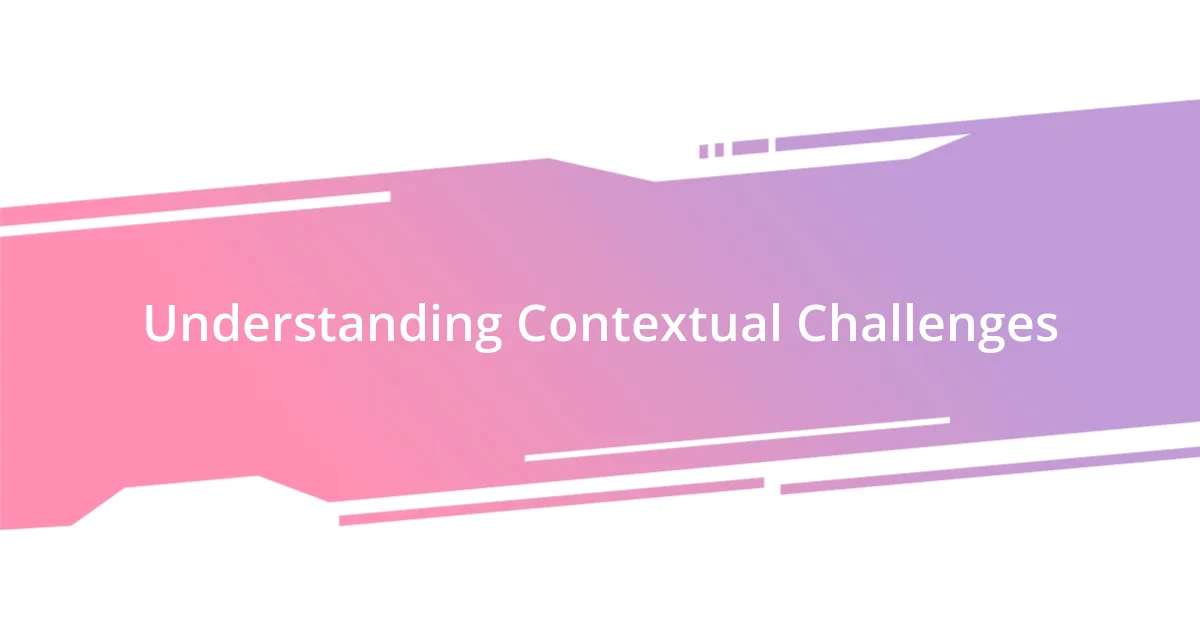
Understanding Contextual Challenges
Contextual challenges can be like those unexpected plot twists in a movie—surprising, disruptive, and even frustrating. I remember a time when I had to adjust my project timeline due to sudden team changes. It made me realize that flexibility is not just a skill but a vital survival tool in navigating the complexities of context.
Have you ever faced a situation where everything seemed to shift under your feet? I vividly recall a moment in a team meeting when a colleague’s feedback changed the course of our project. Initially daunting, that experience taught me to embrace uncertainty, recognizing it as part of the process rather than an obstacle. Understanding these challenges requires a mindset open to recalibration.
Contextual challenges often hinge on the interplay between variables, like team dynamics, organizational changes, or external pressures. Reflecting on my experiences, I find that my ability to adapt directly correlates with how well I listen and respond to my environment. Isn’t it fascinating how our surroundings can dramatically influence our decisions? Embracing these influences can lead to growth and innovation.
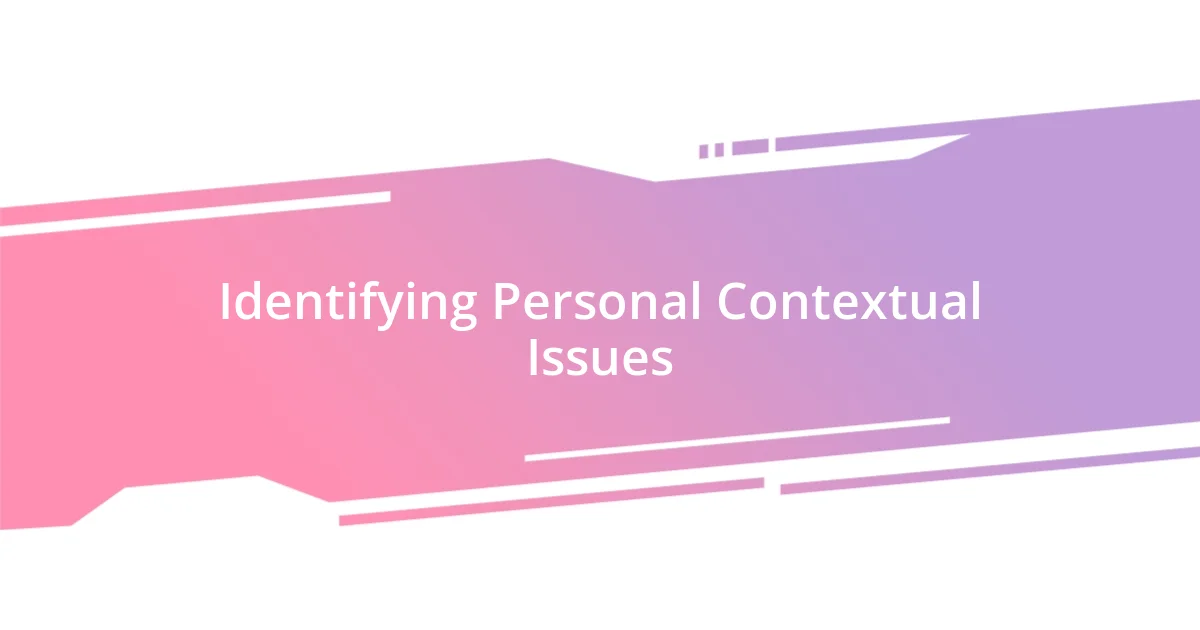
Identifying Personal Contextual Issues
Identifying personal contextual issues often starts with an honest self-reflection. I remember a time when I felt overwhelmed by my workload, only to realize that I had consistently underestimated the impact of my time management habits. It’s almost like peeling back layers of an onion; each layer reveals something new about my efficiency and stress points. Noticing how my daily routines affected my performance was a pivotal moment for me.
In my experience, personal contextual issues frequently bubble up when I assess my emotional responses to certain situations. For example, during a particularly tense project deadline, I noticed that my frustration with team communication was heightened by my own anxiety. This led me to realize that my emotional state is influenced not just by the tasks at hand but also by the dynamics around me. By identifying these triggers, I gained better control over my reactions and contributed to a more harmonious work environment.
To truly identify personal contextual issues, I encourage a proactive approach. This could involve seeking feedback from peers or maintaining a journal to track patterns in behavior and emotion. Such reflections can reveal underlying issues that need addressing, similar to how a gardener must regularly check for weeds to keep their plants healthy. How have you found success in reflecting on your own context? I’ve often found that the answers lie within, waiting to be uncovered through mindful consideration.
| Aspect | Example from My Experience |
|---|---|
| Time Management | Underestimated how routine habits affected my workload |
| Emotional Responses | Felt heightened frustration during project deadlines |
| Proactive Reflection | Used journaling to uncover behavioral patterns |
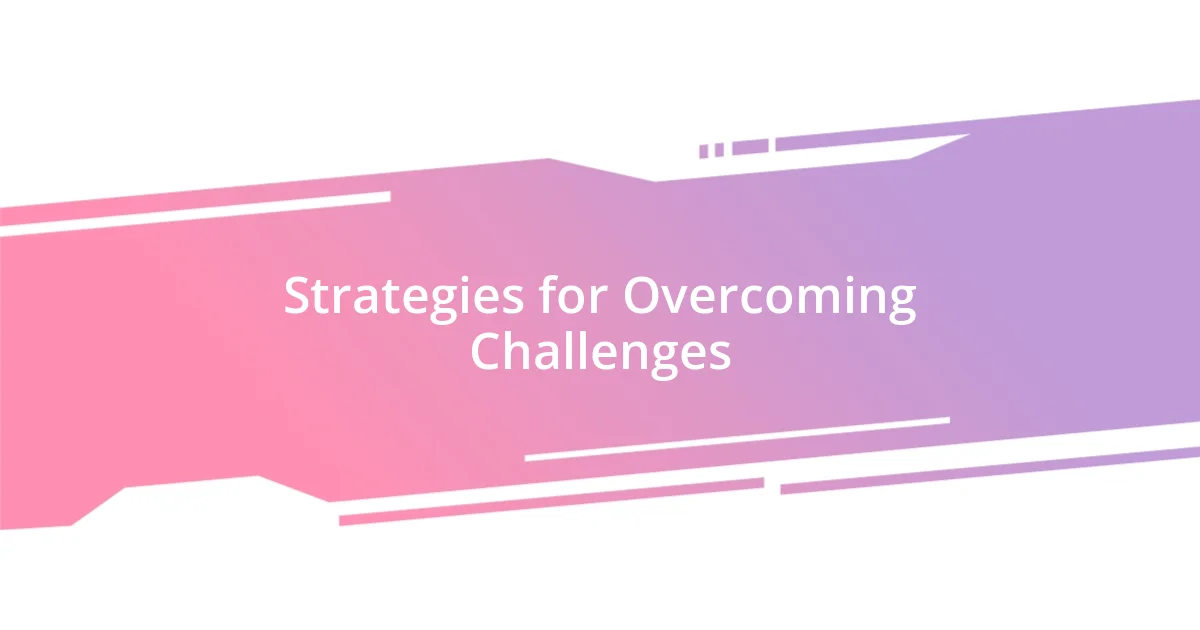
Strategies for Overcoming Challenges
When faced with challenges, I’ve discovered that a well-structured plan can make all the difference. There were instances in my career where breakdowns in communication threatened project success. In those moments, I focused on enhancing transparency among team members to ensure everyone’s voices were heard. This approach not only built trust but also fostered collaboration, allowing us to tackle challenges head-on.
Here are some strategies I’ve found effective in overcoming challenges:
– Open Communication: I often hold regular check-ins to allow team members to voice concerns, which raises collective awareness.
– Flexibility in Plans: Adapting my strategies was critical when unexpected events arose; I learned not to cling too tightly to initial plans.
– Seek Support: Collaborating with mentors or peers has been invaluable; their perspectives can shine light on solutions I hadn’t considered.
– Develop Coping Mechanisms: I engage in stress-relief techniques like meditation, which helps me maintain clarity and focus during tough times.
Reflecting on past experiences, I recall a challenging phase during a significant project. A last-minute client request altered our trajectory, leaving the team scrambling. To ground ourselves amidst the chaos, we established a prioritization matrix. This simple tool helped us evaluate tasks based on urgency and importance, ensuring that we tackled what truly mattered. Such practical strategies, rooted in collaborative effort, can be game-changers.
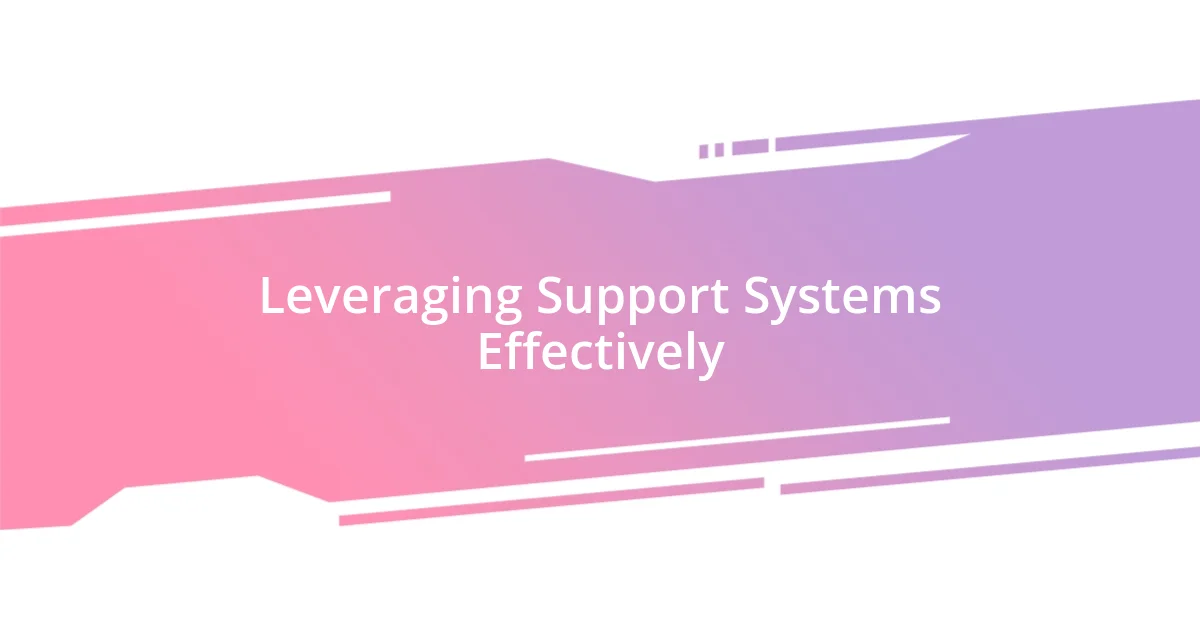
Leveraging Support Systems Effectively
When I think about leveraging support systems effectively, I recall a moment when I truly embraced my network. I was grappling with a particularly daunting project, and it struck me how isolating it can feel to confront challenges alone. Reaching out to colleagues not only provided me with fresh perspectives but also reignited my motivation. Have you ever considered how much your network can lift you up? It’s amazing how simply sharing your worries can lighten the load.
I remember an instance when I was overwhelmed by multiple deadlines, and one friend suggested a brainstorming session over coffee. It turned into a mini retreat for us both, where we swapped ideas and strategies while enjoying a warm cup. That casual environment made it easy to think outside the box, and we ended up coming up with solutions that neither of us would have stumbled upon individually. It’s a reminder that sometimes, all it takes is a supportive ear to turn chaos into clarity.
Additionally, I can’t overstate the importance of mentorship in my journey. Having a mentor or coach to lean on has been an invaluable resource. I remember discussing my struggles with a mentor who offered a perspective I hadn’t considered: to view obstacles as opportunities for growth. That shift in mindset was transformative. What about you? How have mentors or role models shaped your ability to tackle challenges? For me, knowing that there’s someone experienced in my corner makes facing hurdles much less daunting.
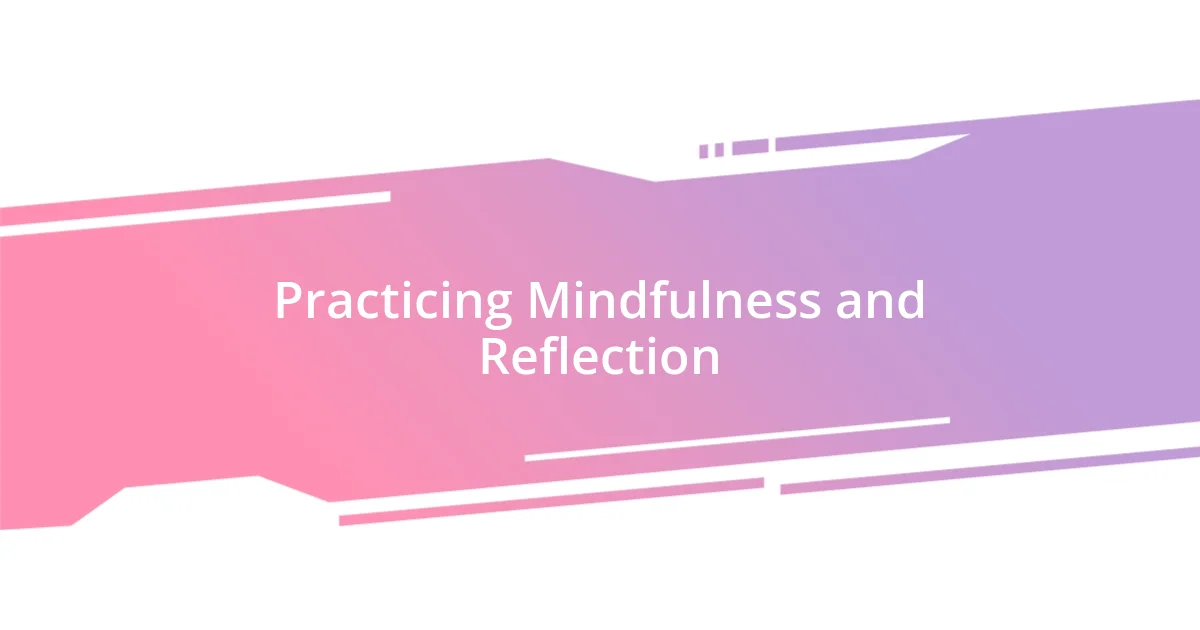
Practicing Mindfulness and Reflection
Practicing mindfulness and reflection has profoundly impacted my ability to navigate challenges. There have been times when the pressure seemed overwhelming, and in those moments, I turned to mindfulness techniques like focused breathing. It may sound simple, but taking just five minutes to center myself allowed me to clear my mind, regain composure, and approach problems with renewed energy. Have you ever tried pausing to breathe deeply during a stressful situation? I’ve found that it truly helps create a mental reset.
In my experience, journaling has been a powerful tool for reflection. I often jot down my thoughts after a challenging day, mapping out what worked and what didn’t. I can still remember a particularly tough project where I felt lost. Writing down my feelings not only provided clarity but also revealed patterns I hadn’t noticed before—like how I often underestimate the time it takes to complete certain tasks. Reflecting on those insights helped me improve my planning for future projects. Isn’t it fascinating how a simple act like writing can illuminate so much?
Mindfulness practices are not just about calming the storm; they also prompt deeper self-awareness. I recall a moment when I was caught in a whirlwind of anxiety about an upcoming presentation. Instead of letting my nerves control me, I refocused by visualizing success and remembering past triumphs. This conscious shift in my mindset was crucial. How do you usually handle pressure? I’ve learned that embracing these reflective practices can strengthen my resilience, making me better equipped to face whatever challenges come my way.
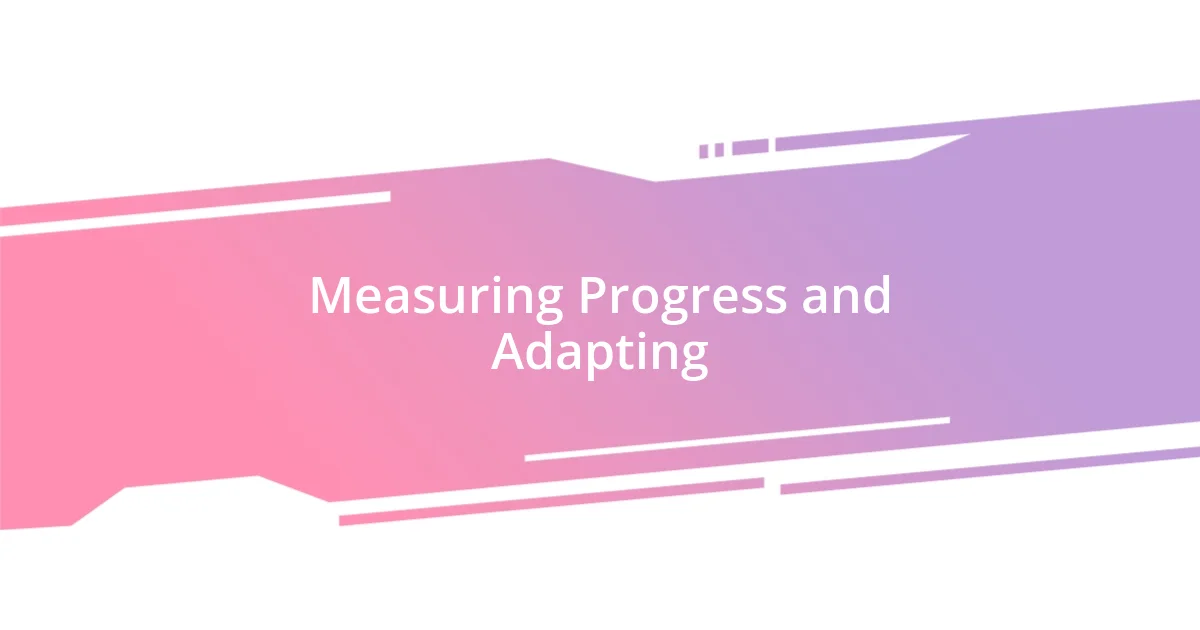
Measuring Progress and Adapting
Measuring progress is a nuanced process that requires a keen eye for detail. I remember a time when I set specific goals for a project but soon realized many were vague. It was frustrating until I began breaking down each target into smaller, actionable steps. Have you ever felt overwhelmed by a broad goal? By tracking my achievements weekly, I could celebrate small wins that fueled my motivation.
Adapting to changing circumstances has been an essential part of my journey. I faced a situation where a new software tool was introduced, drastically altering my workflow. Initially, I resisted the change, thinking I could stick to what I knew. However, after seeking feedback and adjusting my approach, I discovered not only did the tool simplify my tasks, but it also opened up new opportunities for collaboration. How often do we resist change simply out of comfort? Reflecting on this helped me become more open-minded and flexible.
I’ve found that measuring progress isn’t just about numbers; it’s about feelings and growth as well. I distinctly recall meeting with a colleague who shared her metrics from a recent campaign. I was struck by how she expressed her emotional milestones, like feeling less anxious or more confident in meetings. That conversation shifted my understanding; progress can be as much about internal growth as it is about external achievements. How do you define your personal growth? It’s a valuable reminder that recognizing changes within ourselves can be just as significant as hitting target numbers.
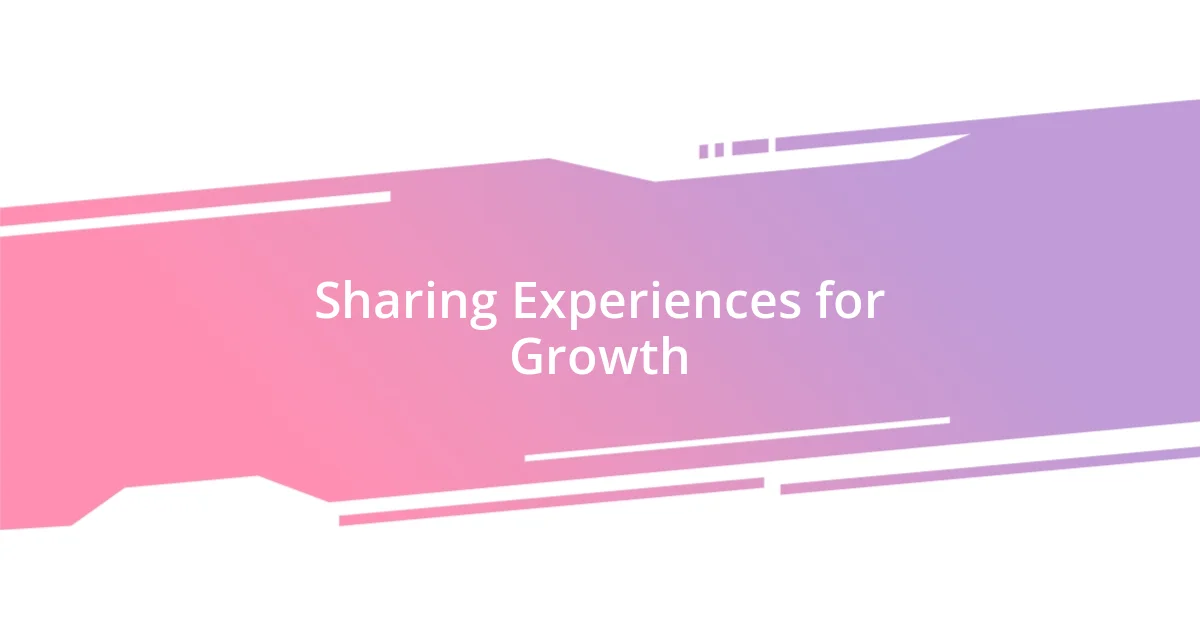
Sharing Experiences for Growth
Sharing my experiences with others has been transformative for me. Recently, I opened up about my struggles during a networking event, and to my surprise, several people shared similar challenges. It was an eye-opener—realizing I wasn’t alone made the conversation not just comforting, but a powerful catalyst for growth. Have you ever shared a struggle only to find that it resonates with someone else? It’s fascinating how vulnerability can connect us and foster understanding.
One memorable moment came when a mentor shared her journey of setbacks as we discussed our career paths. Her candidness about feeling lost at pivotal points highlighted that even seasoned professionals face hurdles. Hearing her story allowed me to reframe my own experiences, seeing challenges not as roadblocks but as stepping stones. It prompted me to shift my perspective—if she could find growth through her difficulties, why couldn’t I?
What astonishes me is how these shared experiences often lead to actionable insights. For instance, during a team meeting, I revealed my method for managing time, which had always been a struggle. To my surprise, a colleague suggested a strategy that transformed my approach. It’s moments like these that demonstrate the valuable exchange of ideas we miss out on when we keep our experiences to ourselves. How might sharing your own journey help you gain new perspectives? It’s a reminder that collaboration and openness can illuminate our paths in ways we never expected.














